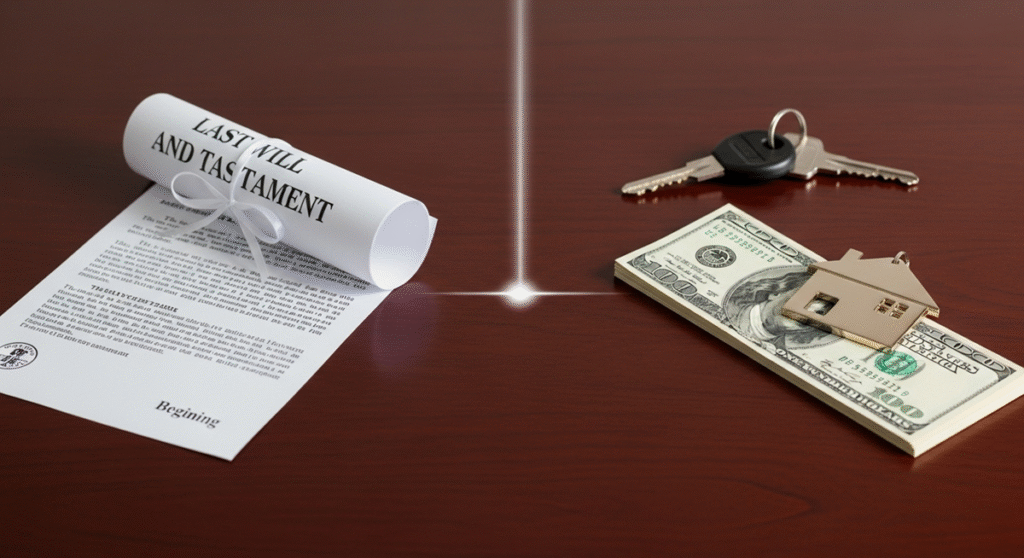| Loan Type | Who It’s For | Purpose | Repayment | Key Limitation |
| Estate Loan | Executor/Admin | Cover estate debts or taxes | From estate after probate | Requires court approval |
| Heir Advance Loan | Beneficiaries | Access inheritance early | Deducted from final share | Reduces total inheritance |
| Hard Money Loan | Estate or Heir | Short-term financial needs | Term-based, with interest | High rates, strict terms |
⏳ Still waiting on your inheritance?
Most heirs don’t realize probate can stretch 12–24 months.
Check your state’s average timeline and find out where your money really stands.
→ Estimate Your Probate Timeline
What Probate Means for Property Loans
- Probate process: When someone passes away, their assets, including their house, go through probate. This is a court-supervised process where the estate gets settled and distributed to the rightful heirs.
- Temporary ownership: During probate, no heir officially owns the house. Instead, it’s controlled by the estate, and no financial moves can be made without court permission.
- Loan restrictions: You can’t take out a regular mortgage on a home in probate unless a judge gives written approval. Even if you’re the heir, you still need legal clearance.
Who Can Apply for a Loan During Probate
- Authorized person: Only the court-appointed executor (if there’s a will) or administrator (if there isn’t) can legally handle matters like loans on behalf of the estate.
- Role of the court: In most cases, the representative must file a petition to borrow against the property. Without court approval, the loan can’t proceed.
- Involving heirs: If multiple heirs are part of the estate, the court might require their consent before allowing a loan.
Loan Types Available for Probate Property
- Estate loans: These are loans taken out by the estate, not individuals. The funds are typically used to pay off debts, taxes, or administration expenses. The estate rep uses the home as collateral.
- Heir advance loans: These aren’t traditional loans. They’re more like a cash advance on your expected inheritance. The advance is paid back from your share of the estate when probate ends—no monthly payments involved.
- Hard money loans: Private lenders offer these loans using your property as collateral. They have higher interest rates, are usually short-term, and cover urgent needs like repairs or legal costs.
How to Get a Loan on a Probate House
- Get legal authority: Make sure you’re officially recognized by the court as the executor or administrator of the estate.
- File a petition: File a formal request with the probate court to get a loan against the house. Include the loan details, property value, and how you plan to use the money.
- Appraise the property: A current appraisal is required to establish the home’s value and determine loan eligibility.
- Find the right lender: Search for a lender who understands probate lending. Regular banks usually won’t handle this type of financing.
- Finalize documents: Once court approval is granted and a lender is secured, complete the paperwork and record the lien on the property.
Common Roadblocks Along the Way
- Delays in court: Probate moves at the court’s pace, and scheduling hearings can take weeks or months.
- Heir disputes: If other heirs object to the loan, they may challenge it in court, causing further delays or even denial.
- Title issues: Some probate properties have unclear ownership or existing liens, which makes lenders hesitant.
- High costs: Probate loans come with higher rates and fees than traditional mortgages, making them expensive if not carefully planned.
- Limited lender options: Not many lenders offer probate loans, so choices are restricted, and terms may be less favorable.
Smart Ways to Make the Process Easier
- Work with a probate attorney: Having legal support makes navigating court requirements much smoother. An attorney can also help interpret complex loan terms.
- Keep records: Document every step, from communications with heirs to loan proposals and court filings. This helps reduce conflicts.
- Communicate clearly: Keep all heirs informed. Being open helps prevent disagreements later.
- Start early: Don’t wait until you’re in a time crunch. Getting a head start helps you avoid unnecessary delays.
- Choose lenders wisely: Not all lenders operate in good faith. Be sure to understand the loan’s full cost and review all contract terms carefully.
When You Might Want to Skip the Loan
- Disputed estates: If the estate is already facing challenges or legal action from heirs, adding a loan can make things worse.
- Low equity homes: If the home’s value is close to or less than what’s owed, lenders may not approve a loan or the financial risk might not be worth it.
- Bad loan terms: High interest, short repayment terms, and unclear conditions should be warning signs that it’s time to consider other solutions.
What You Can Do Instead
- Sell after probate: Waiting until probate closes allows the estate to sell the house outright, avoiding additional financial complications.
- Negotiate with creditors: Some creditors will agree to wait until the estate is settled before demanding payment.
- Use other assets: If the estate includes stocks, savings, or other valuable items, borrowing against those might be easier and cheaper.
- Arrange a buyout: If multiple heirs are involved, one can pay the others to gain full ownership, avoiding the need for outside loans.
Conclusion
Getting a loan on a house that’s in probate isn’t as simple as getting a regular mortgage, but it’s possible with the right steps. You’ll need to be legally authorized, obtain court approval, and work with lenders who are familiar with probate-specific loans. Whether you’re looking to cover estate debts, make repairs, or secure inheritance advances, you have several loan types to explore. Still, you should be careful. Some loans come with steep costs, and in certain cases, skipping the loan may be the smarter move. Always weigh the benefits and risks before moving forward, and consult a probate attorney to avoid costly mistakes.
Key Takeaway: It’s possible to borrow against a house in probate, but only with court approval, legal authority, and a clear plan. Always review your options before locking into a loan.
FAQs
Can a probate house be rented out before probate ends?
You can only do that with the court’s okay. The rental income counts as part of the estate and needs to be reported properly.
Can I use the house as collateral for a personal loan during probate?
No. The home legally belongs to the estate during probate, and only the court-appointed representative can authorize its use for a loan.
What happens if the house is in another state?
You may need to open an ancillary probate case in that state to handle the property. Each state has its own probate rules.
Will probate loans reduce what heirs receive?
Yes. Any borrowed money and associated fees must be repaid before the estate is distributed, which can lower the amount heirs ultimately get.
Can I take multiple loans on a probate property?
It’s highly unlikely. Most courts and lenders prefer a single, documented loan, and adding more could create legal and financial complications.



